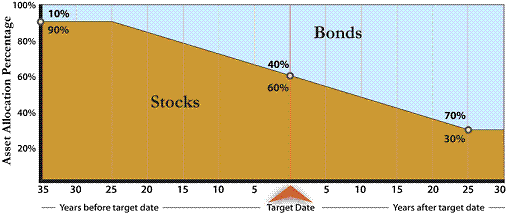What are Those Target Date Things in My Retirement Plan?
(This page may contain affiliate links and we may earn fees from qualifying purchases at no additional cost to you. See our Disclosure for more info.)
If your employer offers a retirement savings plan, chances are one of your investment options is a target-date fund.
They may be grouped under a heading such as “Do the Investing for Me”, “Balanced”, or “Asset Allocation”. You'll recognize them because they have a year in their name, such as 2045.
You may have some of your savings invested in one, even if you didn’t choose it.
Your company is allowed to pick a target-date fund for you if you don’t select any investments yourself, and the fund is appropriate for your age. (Learn more investing basics.)
So, what is a Target Date Fund?

Target date funds are fully diversified investment options, holding U.S. and foreign stocks, bonds, and other investments.
The investment mix within the funds gradually becomes more conservative as the year in the fund title gets closer.
The funds generally come in a series with retirement dates every five years from the nearest current retirement fund.
Funds with dates far in the future will usually hold at least 80 percent in risky stock market investments. But funds can differ in how much risk they take as the retirement date gets closer.
The average allocation to stock markets at the retirement date across the industry is about 50 percent, but it ranges between 30 and 70 percent.
The investment strategy and how it changes over time is called the glide path. It will be shown in the fund literature and look something like the following chart.

The average target-date fund expense is 0.67 to 0.77 percent of invested dollars per year, depending on how far away the retirement date is.
However, index varieties have lower expenses and are becoming more prevalent.
These funds are designed to be one-stop investment alternatives you can hold for your entire career. The investment strategy automatically adjusts for the time remaining before you retire.
You simply choose the fund with a target date closest to your likely retirement date. Then all you have to worry about is contributing to your plan.
Recommendd Reading: What Is Your Retirement Number?
Are They Available Outside of Retirement Accounts?
Target date funds are also available beyond your retirement plan. You can invest in them in any type of account.
Some 529 college savings plans offer similar funds to help you invest for your children’s education.
While the investment strategy of the fund automatically changes over time to what’s appropriate for your age, target-date funds are not guaranteed. No one will send you a check in the year of the fund.
However, your savings will be invested reasonably for someone who is living on their savings.
Downside to Target Date Funds
The downside is even the funds with nearby retirement dates will lose value in about two out of every ten years.
If your first year in retirement is one of those two and your initial withdrawal is a large portion of your account, your savings may not recover.
For most, a 50 percent allocation to stocks when you retire is reasonable. It provides enough opportunity for growth to sustain a retiree’s spending through a long retirement while allowing enough stability to make current withdrawals manageable.
A lower allocation to stocks could result in returns too low for your savings to last. But your withdrawals must be small relative to your total balance in the early years.
They should be no more than 4 percent of the balance the first year. If your withdrawal needs are more substantial than this, target-date funds may be too risky for you.

Using Target Date Funds
Target date funds are a good investment option, making investing your savings for your retirement as simple as choosing when you want to retire.
They are available in most work-related retirement plans, and you can invest in them in most other types of accounts as well.
However, if you're nearer to retirement, consider whether your withdrawals will be too large to withstand the investment risk before choosing one.
Like any investment, remember there are risks and fees you need to be aware of.
While target-date funds simplify investing, be careful to not ‘set it' and ‘forget it'.
Review your investment allocations and fees at least annually to ensure they are still working for you.
Next: Nothing Happens Without a Plan
Article written by, Guest Contributor Julie Grandstaff a veteran of the financial services industry. She spent her career managing investments for institutions as well as individuals and retired at the age of 51 after reaching her savings goals. Julie is the author of Save Yourself: Your Guide to Saving for Retirement and Building Financial Security. She lives with her husband Jeff in Portland, Oregon, and blogs about saving and investing for retirement at juliegrandstaff.com.
